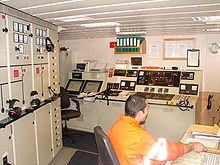| Revision as of 20:32, 14 October 2012 editMakagon (talk | contribs)25 editsNo edit summary← Previous edit | Revision as of 18:50, 21 November 2012 edit undo137.30.141.14 (talk)No edit summaryNext edit → | ||
| Line 14: | Line 14: | ||
| The Engine Department emerged with the arrival of marine engines for propulsion, largely during the latter half of the 19th century. Due to the advancement in Marine Technology during the twentieth century, the engineering department is considered in ] as equally important as the ], since trained engineers are required to handle the machinery on a ship.{{cn|date=July 2012}} | The Engine Department emerged with the arrival of marine engines for propulsion, largely during the latter half of the 19th century. Due to the advancement in Marine Technology during the twentieth century, the engineering department is considered in ] as equally important as the ], since trained engineers are required to handle the machinery on a ship.{{cn|date=July 2012}} | ||
| Nowadays due to the increase in ] on Merchant Vessels and increase in the Unattended Machinery Spaces (UMS) class vessels the number of |
Nowadays due to the increase in ] on Merchant Vessels and increase in the Unattended Machinery Spaces (UMS) class vessels the number of seafaring engineers have decreased drastically on board a Merchant Ship. Today the Engine department usually consists of the following number of Engineers and crew:{{cn|date=July 2012}} | ||
| * (1) ] | * (1) ] | ||
Revision as of 18:50, 21 November 2012
| This article includes a list of general references, but it lacks sufficient corresponding inline citations. Please help to improve this article by introducing more precise citations. (July 2012) (Learn how and when to remove this message) |

In maritime transportation, the engine department or engineering department is an organizational unit aboard a ship that is responsible for the operating, maintaining and repairing the propulsion systems and the support systems for crew, passengers and cargo. It is also responsible for repairing and maintaining other systems on ship such as:
- Electrical Power Generation Plant
- Lighting
- Fuel oil
- Lubrication
- Water distillation
- separation
- Air conditioning
- Refrigeration
The Engine Department emerged with the arrival of marine engines for propulsion, largely during the latter half of the 19th century. Due to the advancement in Marine Technology during the twentieth century, the engineering department is considered in merchant navy as equally important as the Deck department, since trained engineers are required to handle the machinery on a ship.
Nowadays due to the increase in Automation on Merchant Vessels and increase in the Unattended Machinery Spaces (UMS) class vessels the number of seafaring engineers have decreased drastically on board a Merchant Ship. Today the Engine department usually consists of the following number of Engineers and crew:
- (1) Chief Engineer
- (1) Second Engineer
- (1) Third Engineer
- (1-2) Fourth Engineer
- (2-4) Junior Engineer
- (0-1) Engine Cadet
- (0-2) Oiler
- (0-1) Wiper
- (0-1) Fitter
- (0-1) Motorman
- (0-1) Machinist
See also
- Marine engineer
- Engine room
- List of maritime colleges
- Marine fuel management
- Seafarer's professions and ranks
- Society of Naval Architects and Marine Engineers
References
| This article includes a list of general references, but it lacks sufficient corresponding inline citations. Please help to improve this article by introducing more precise citations. (November 2008) (Learn how and when to remove this message) |